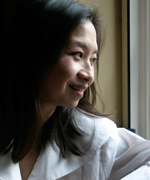
ensemble piece for wind, strings, harp, piano, xylophone and chimes
Updated 19 January 2010
MP3 - (6.20 MB) live recording Vredenburg; **** NEW!!!!!
broadcasted on Radio 4, Netherlands, 22 February at 9:15 pm approx.
All Tuned Out - revised @ 23 Jan 2007

About "All Tuned Out"
Consistent with David Dramm's "No Place to Hide" project theme, this piece centres around the idea of filtering out the noise from the music. It begins with what seems
like an ensemble tuning up --- the oboe sounds an even A and others follow. When this happens on stage, it's a signal for the audience to stop talking and start listening. What emerges, however, is a piece based on a twelve-tone row with a very tonal hymn struggling to be heard. Although the hymn does overcome the "noise" in the end, the twelve tone row returns to drown it out.
About Anne Ku
Born in Brunei of Chinese parents, Anne Ku spent her childhood in Okinawa and received a full scholarship to Duke University in the US where
she studied piano under Randall Love. Besides studying composition at HKU Faculty of Music, she is also active promoting piano guitar duo music, writing didactic music for teaching piano,
and as organiser of the Monument House Concert Series in Utrecht. Since obtaining her Bachelor of Music in Composition in 2008, she has been active performing with her piano guitar duo.
Marco Bons, conductor
Ensemble Musicians:
Elivera van Sloten, flute
Jorinke van Deelen, oboe
Willeke de Laak, clarinet
Marjolein Wielinga, bassoon
Jens, 1st violin
Charlotte van Tongeren, 2nd violin
Floor Feleus, viola
Caroline Deul, cello
Slava Kumanikin, double bass
Liesbeth Vreeburg, harp
Angelique van Heemsbergen, piano
Reinhard Wilkens, percussion

replacing the previously titled
for ensemble of flute, oboe, clarinet in Bb, bassoon, xylophone, concert harp, piano, 2 violins, viola, cello, and double bass
Approximate duration: 4'35”
composed by
30 November 2006
David Dramm Project – Vredenburg
Orchestral and part scores available by request.
Composition notes:
• Version 1 is intended for a first reading by the ensemble and conductor. Subsequent versions will be indicated.
• The first section emulates tuning up (title of the piece) and gradually merges into a big sound field.
• The “Libero” tempo until section A gives the conductor and players liberty to start approximately, not exactly, where shown. In section A, a 12 tone row (C B C# Bb A D Ab G D# Gb F E) is introduced and manipulated in different ways (transposition to a 5th above, retrograde of entire passages, isorhythm, etc)
• A four-voiced hymn struggles to be heard. This is a study of noise and music, that of tuning into something that is recognisable, the victory of music over noise.
Outstanding: dynamic markings (for relative volume adjustment), articulation, part scores with cue notes.